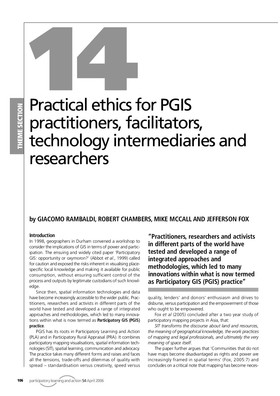Practical ethics for PGIS practitioners, facilitators, technology intermediaries and researchers (PLA 54)

when sharing experiences relating to PGIS practice to focus on success stories and practitioners can be hesitant in engaging in critical reflection relating to their own work. These important but little discussed issues include potential pitfalls that projects might face, the concerns surrounding precision, and the ethics of the practice. Giacomo Rambaldi, Robert Chambers, Mike McCall and Jefferson Fox’s paper attempts to address such ethical issues raised during the conference and also from further discussion among practitioners and researchers via different channels. No conference papers specifically addressed ethics in PGIS practice. But ethics emerged as one of the main crosscutting concerns of the conference participants throughout. Issues raised included the costs of wasting people’s time, of raising expectations that are not met, of endangering people through the information they show, of the practice being used to extract information and/or put it in the public domain which outsiders would then exploit, as well as of the practice actually creating conflicts and demanding precision where fuzziness might be more appropriate.
Participatory Learning and Action (PLA, formerly PLA Notes) is the world's leading series on participatory learning and action approaches and methods. PLA publishes articles on participation aimed at practitioners, researchers, academics and activists. All articles are peer-reviewed by an international editorial board. See: www.planotes.org
Article in: PLA 54. Guest-edited by: Giacomo Rambaldi, Jon Corbett, Michael K. McCall, Rachel Olson, Julius Muchemi, Peter A. Kwaku Kyem, Daniel Wiener, Robert Chambers
Keywords: mapping, Participatory Geographic Information Systems (PGIS), PPGIS, Geographic Information Technologies and Systems, geo-spatial information management tools, sketch maps, participatory 3D models (P3DM), aerial photographs, satellite imagery, Global Positioning Systems (GPS), Geographic Information Systems (GIS), software.
To read the full table of contents or download whole issue please click on More information above.
Cite this publication
Available at https://www.iied.org/g02957